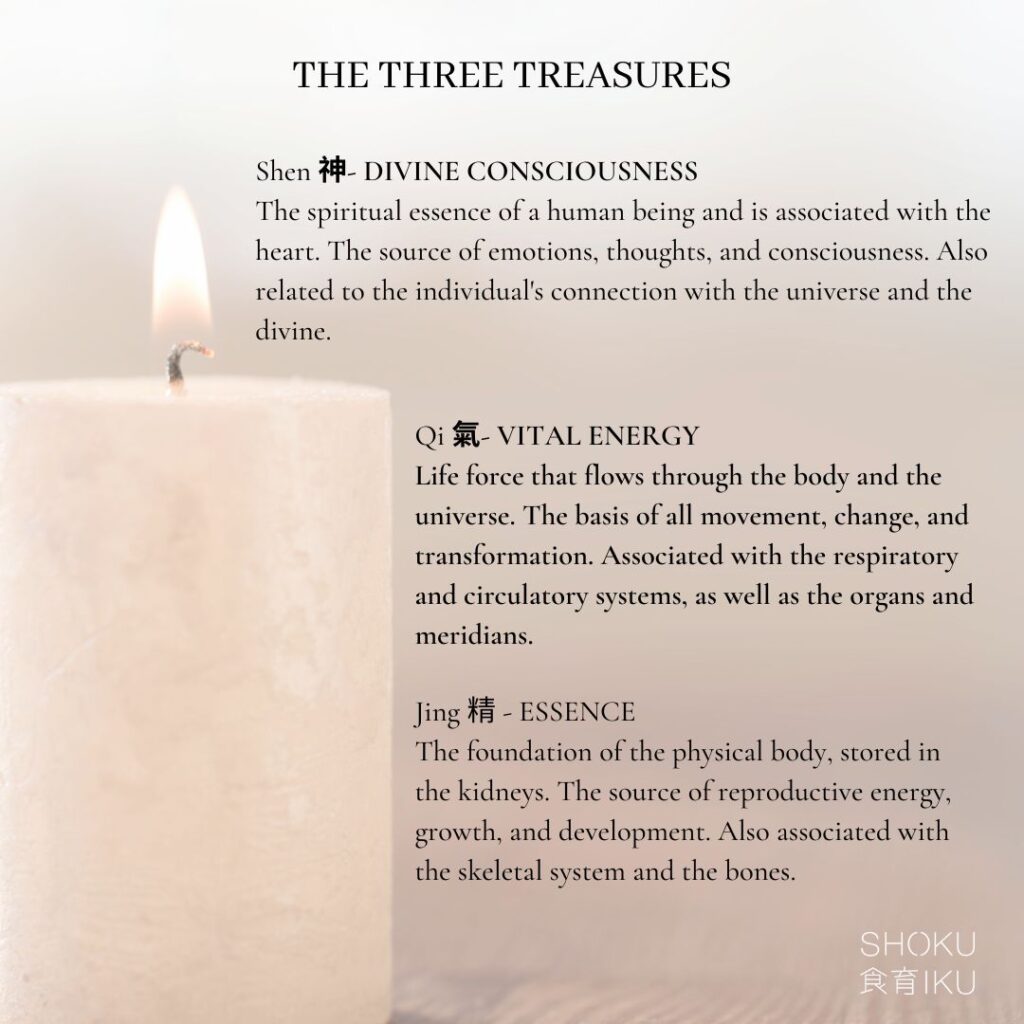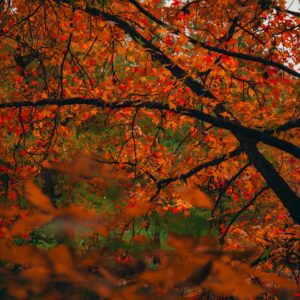
Beta-Glucans in Medicinal Mushrooms: The Healing Compound You Should Know About
In the world of tonic herbs and medicinal mushrooms, there’s

Kick-start, energise, rejuvenate
All carefully planned and prepared to help nourish, reset and rejuvenate the body and mind.
The Three Treasures, also known as Jing, Qi, and Shen, form the foundation of the most significant philosophical concepts in Traditional East Asian Medicine. These concepts, holism and mind-body synthesis are crucial to understanding the essential qualities associated with the Three Treasures and their interconnectedness. To achieve longevity and healthy life, it is essential to comprehend and preserve the Three Treasures.
精 Jing: The first treasure is Jing, which can be translated as essence or vitality. Jing is the foundation of the physical body and is believed to be stored in the kidneys. It is the source of reproductive energy, growth, and development. Jing is also associated with the skeletal system and the bones.
氣 Qi: The second treasure is Qi, which can be translated as breath, energy, or life force. Qi is the vital energy that flows through the body and the universe. It is the basis of all movement, change, and transformation. Qi is associated with the respiratory and circulatory systems, as well as the organs and meridians in Chinese medicine
神 Shen: The third treasure is Shen, which can be translated as spirit, consciousness, or mind. Shen is the spiritual essence of a human being and is associated with the heart. It is the source of emotions, thoughts, and consciousness. Shen is also related to the individual’s connection with the universe and the divine.
The primary tonic herbs are rich in one or more of the Three Treasures, which are Jing, Qi, and Shen. These tonic herbs are considered to be natural sources of the Three Treasures, which sets them apart from remedial herbs that do not have a significant presence of the Three Treasures. Essentially, the main difference between tonic herbs and remedial herbs is that the former contains an abundance of the Three Treasures, whereas the latter does not.

JING
Jing herbs are classified into two categories: Yin and Yang tonics. By combining Yin and Yang herbs in one’s diet, complex formulas have been developed over the years to boost both types of energy. The key to revitalization and maintaining good health is to restore and maintain the proper balance between Yin and Yang.
YIN JING: Yin Jing is a concentrated essence of Yin energy that has a nourishing effect on the body. It has many qualities, including blood building, marrow nourishing, body-fluid nurturing, cooling, and calming. Yin depletion is a common occurrence as we age, and it can also be caused by stress, overwork, exhaustion, childbearing, medication use, disease, excessive emotionalism, and sexual excess. When people are deficient in Yin Jing, they may experience chronic exhaustion, dark circles under their eyes, backaches, weak kidneys and reproductive functions, low resistance, weak digestion, and rapid ageing, such as premature greying, dryness and wrinkling of the skin.
To replenish spent Yin Jing and build reserves for the future, Yin Jing herbs are consumed. These herbs are well-known for their long-term regenerative qualities and are believed to be youth-preserving and moistening. Yin Jing herbs are considered to be the cornerstone of rejuvenation and the foundation of longevity in Eastern traditional medicine. They are highly recommended for people who have depleted their Yin Jing reserves.
YANG JING: Yang Jing is the fundamental power source that lies deep within the body. It is responsible for activating Yin Jing and using it as fuel to generate strength, willpower, creativity, sexual motivation, sexual potency, and outward movement. Yang energy is characterized by warmth or heat. It is the driving force behind a successful life and is closely linked to the body’s five primary organs, especially the kidneys, which can conserve and control Yang Jing as needed.
Yang herbs are renowned for their empowering properties, which help reignite the flame of life where it has been spent and boost vigour at the deepest levels. These herbs are often used to enhance sexual energy, creative power, willpower, and athletic performance. Regular consumption of Yang Jing herbs can lead to renewed youthfulness. However, it’s essential to maintain a balance between Yin and Yang energies, as Yang herbs tend to be warm and stimulating, which can exacerbate Yin deficiencies. If you wish to incorporate Yang herbs into your diet, it’s recommended to first build up your Yin Jing or consume with Ying Jing herbs.
QI
There are two main Qi categories, Qi tonics and Blood tonics. It is commonly believed that Qi governs men and blood governs women, meaning men usually benefit more from Qi tonics and women from blood tonics. However, this doesn’t imply that men don’t require blood or women don’t require Qi. It’s simply a matter of maintaining a natural balance. Therefore, everyone should consume both Qi and blood tonics as needed to maintain a healthy balance.
Qi:
Vitality- The energy provided by a product that enters the meridian network and its associated organs is rated as vitality. Our body produces Qi daily through breathing and eating, primarily by the Lungs and Spleen. Therefore, it is important to maintain a healthy diet and practice deep breathing to generate Nutritive Qi, which circulates through the meridian system and nourishes our Organs. Most Qi tonic herbs provide this type of Qi, which is conventionally known as “Nutritive Qi,” or simply “Qi.”
Protection – The human body has a unique type of Qi, known as Protective Qi or Wei Qi, which flows in the subcutaneous layer of the skin. This energy empowers the skin to react suitably to changes in the environment. Moreover, Protective Qi has been proven to improve the body’s immune response against pathogens, making us more agile and adaptable to infections.
Adaptability – Adaptability is an ability to adjust to changes in the environment, emotions, and social situations that determines our well-being and survival. People who possess high levels of adaptability tend to be more successful than those who have poor adaptability. Qi tonic herbs, known as adaptogens, are effective in promoting adaptability by providing strength, calmness, and flexibility during periods of both minor and major stress.
Circulation – The smooth flow of Qi through the meridian network is crucial for our overall health and well-being. This can have a profound impact on our daily experiences, making them more harmonious and pleasant.
BLOOD:
Blood building: The state of our blood, including its quality, quantity, purity, vitality, and overall health, is crucial to our well-being. Blood tonic herbs are essential in building healthy and rich blood by increasing the production of red blood cells. Both men and women can benefit from blood tonics, but women, in particular, often require them due to their hormonal and menstrual functions. Herbs that improve red blood cell production are known as blood tonics, while those that enhance white blood cell production fall under the Qi tonic category for protection.
Blood circulation: The proper functioning of our blood circulation is responsible for the distribution of essential molecules and oxygen to all parts of the body. It also plays a key role in eliminating toxins produced during metabolic processes. The capillaries in our body stretch over approximately 50,000 miles, making blood flow a critical aspect of our well-being. Exercise, diet, stress management, and herbs are some of the ways in which we can influence our circulation. However, factors such as poor diet or stress can thicken our blood, which can lead to diminished blood flow. Fortunately, nature offers many herbs and foods that help maintain healthy blood flow.
SHEN
Shen is often translated as “Spirit”, but it is more than that; it also refers to the clarity and awareness of one’s mind. As the ruler of emotions, a person with a strong Shen is calm, centred, and deeply intelligent, and experiences positive emotions such as wisdom, happiness, compassion, and love. On the other hand, if Shen is repressed, negative emotions such as fear, anger, anxiety, jealousy, frustration, and worry can dominate one’s mental state.
SHEN STABILISING: The herbs that stabilize Shen are known to have a calming effect. These herbs are considered more yin in nature, beautifully balance and calm the negative emotions that cause Shen to retreat. Combining with adaptogens and blood tonic can restore emotional balance, leading to a more content and peaceful state of mind.
SHEN OPENING: There are certain herbs that possess a remarkable ability to expand our Shen, allowing it to reach its full potential. These herbs have been recognized to elevate consciousness, expand one’s perception, and dissolve negative emotions. These herbs have been revered by many spiritual leaders and experts, as they are believed to be the most powerful herbs on the planet.

In the world of tonic herbs and medicinal mushrooms, there’s

As the days grow shorter and the air becomes crisp,

Marine phytoplankton, the microscopic organisms that form the foundation of
Copyright Shoku Iku © 2024 | All Rights Reserved.
The statements on this website have not been evaluated by the TGA or FDA. These products are not intended to diagnose, treat, cure or prevent any disease.
Sign up to receive your discount.